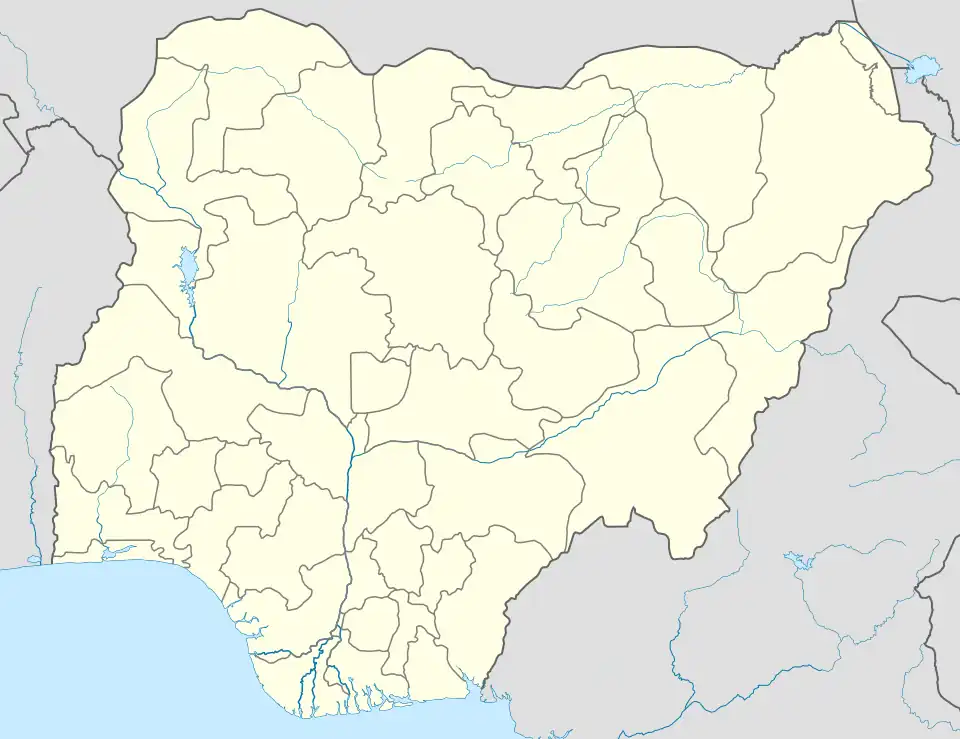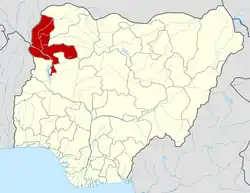Gwandu
gwandu | |
|---|---|
LGA and town | |
| Nickname: TA ABDULLAHI | |
| Motto(s): land of farmers and readers | |
 Gwandu | |
| Coordinates: 12°30′8″N 4°38′33″E / 12.50222°N 4.64250°E | |
| Country | |
| State | Kebbi State |
| Time zone | UTC+1 (WAT) |
Gwandu, also called Gando, is a town and emirate in Kebbi State, Nigeria. The seat of government for the emirate[1][2] and district of this name is in Birnin Kebbi, which is the capital of Kebbi State and was capital of the historical Kingdom of Kebbi.[3] Founded in the sixteenth century by the Kabbawa, a Hausa people Gwandu today acts as one of the four emirates composing Kebbi State.[4]
The town became important during the Fulani jihad, and from 1815 it was one of the two capitals of the Fulani empire[5] until it came under British control in 1903.[6][7][4]
History
The name "Gwandu" derives from the Hausa word gandu, which translates to "royal farmlands." The town's origins can be traced back to its earlier days as a small village under the leadership of the royal farmer of Kanta Kotal, who was the first King of Kebbi who reigned from 1517 to 1561. Over time, the village developed and expanded, eventually becoming a town. One of the factors contributing to the growth of Gwandu was its favorable geographical location and the presence of fertile lands. The area boasted rich pasturelands, which attracted Fulani pastoralists to settle there.
After the Kebbi expedition during the Sokoto jihad, Gwandu emerged as a significant and permanent base for Usman dan Fodio and his followers. Recognizing the strategic importance of the town, Muhammad Bello ordered the construction of a protective wall around the town in 1806. This defensive wall aimed to fortify the city and enhance its security against potential external threats. Although Usman eventually departed from Gwandu, the town retained its significance within the context of the jihad. It became the capital of the newly established Gwandu emirate under the leadership of Abdullahi dan Fodio. The geographical location of Gwandu, nestled in a valley with surrounding ridges, provided natural advantages for defense against external attacks. The town's topography further contributed to its status as a stronghold.[8]: 56
Climate
In contrast to the dry season, which is hot and partially cloudy, the wet season is oppressively hot and cloudy.[9]
References
- ↑ Balogun, S. A. (1973). "Succession Tradition in Gwandu History, 1817-1918". Journal of the Historical Society of Nigeria. 7 (1): 17–33. ISSN 0018-2540. JSTOR 41856982.
- ↑ Jimoh, Mufutau Oluwasegun (2017-05-01). "Gwandu Emirate: The Domain of Abdullahi Fodiyo, Since 1805". Journal of Pan African Studies. 10 (3): 386–390.
- ↑ Balogun, Saka Adegbite. (1970). Gwandu emirates in the nineteenth century with special reference to political relations, 1817-1903. OCLC 38630457.
- 1 2 "GWANDU". Encyclopédie de l'Islam. doi:10.1163/_eifo_sim_2570.
- ↑ Hopen, C. Edward (2018-09-03). The Pastoral Fulbe Family in Gwandu. Routledge. ISBN 978-0-429-95044-5.
- ↑ Tukur, Mahmud Modibbo (2016-08-15). British Colonisation of Northern Nigeria, 1897-1914: A Reinterpretation of Colonial Sources. Amalion Publishing. ISBN 978-2-35926-048-9.
- ↑ "Gwandu | Nigeria". Encyclopedia Britannica. Retrieved 2019-03-20.
- ↑ Gwandu, Abubaker Aliu (1977). Abdullahi b. fodio as a Muslim jurist (Doctoral thesis). Durham University.
- ↑ "Gwandu Climate, Weather By Month, Average Temperature (Nigeria) - Weather Spark". weatherspark.com. Retrieved 2023-09-10.
